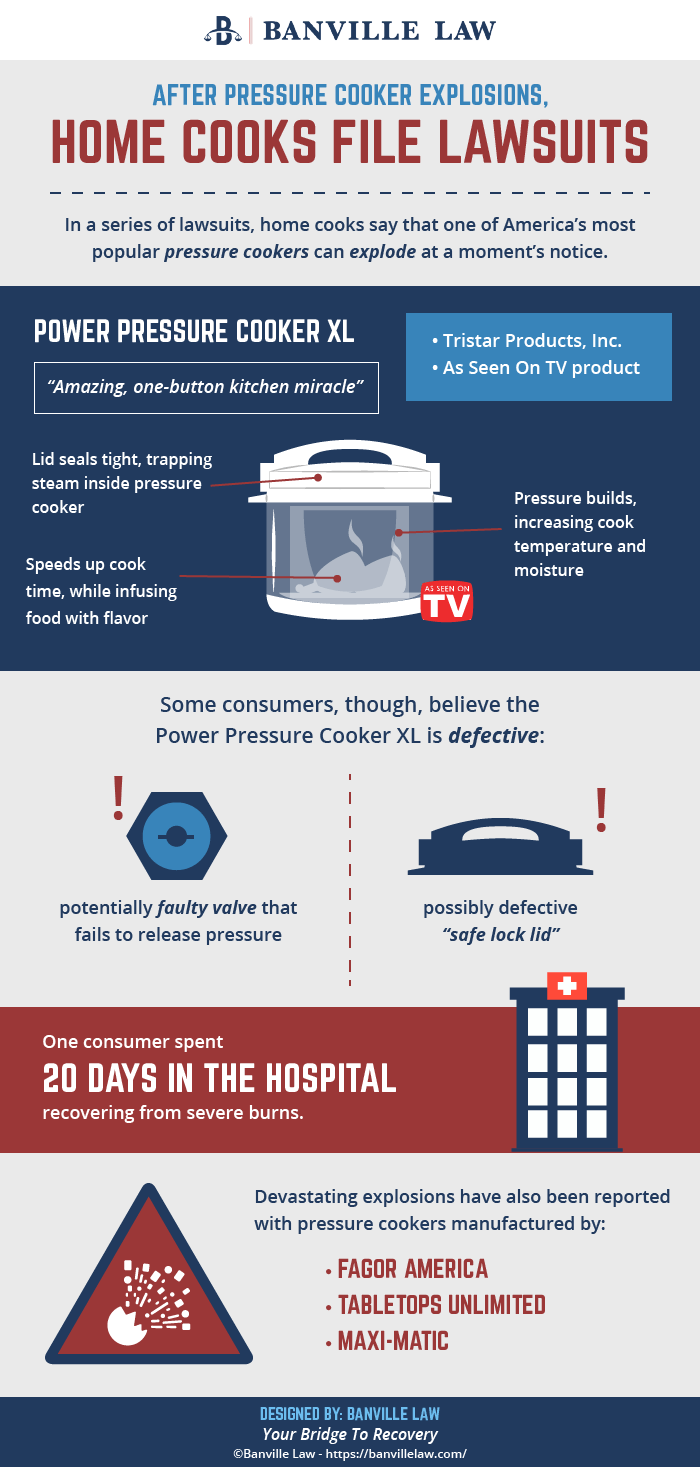Is a major hazard lurking in millions of American kitchens? Home cooks across the country believe that some of the nation’s best-selling pressure cookers, including the Power Pressure Cooker XL manufactured by Tristar Products, are seriously – and dangerously – defective.
Reports of devastating pressure cooker explosions describe sudden product failures, property damage and severe burns, with many consumers requiring emergency medical treatment. In fact, some injured people have even turned to legal action, filing product liability lawsuits for medical expenses, lost wages and emotional trauma.
Over 60 consumers have reported troubling pressure cooker explosions to the US Consumer Product Safety Commission, an arm of the federal government. In complaint after complaint, home cooks accuse appliance manufacturers large and small of selling unacceptably dangerous products to the American public.
Continue reading more types of personal injury accidents that our attorneys handle: https://banvillelaw.com/personal-injury/

A pressure cooker is designed to cook food at very high temperatures. Oftentimes these temperatures exceed 200 degrees Fahrenheit. Our lawyers are currently investigating pressure cooker malfunctions where a device indicates that it has completed the cooking cycle and it is ready to be opened, however it certainly is not. The opening of the pressure cooker causes a release of pressure and an ensuing explosion of liquid that can be hotter than 200 degrees, which can and has lead to serious burn injuries.
Yes, there is a current class-action lawsuit against the manufacturer of certain pressure cookers. This class-action is not recommended for those who suffered burn injuries, and our experienced product liability attorneys recommend that those injured by exploding pressure cookers opt-out of the class action immediately to protect their personal injury claim against the manufacturer. The pending pressure cooker class action will not hold the manufacturer accountable for injuries. If you fail to opt-out, you waive your claim to compensation for burn injuries.
Immediately seek medical attention. Our lawyers have seen very serious 2nd and 3rd-degree burn injuries from explosions. Make sure to save the defective pressure cooker as evidence. Contact an experienced product liability attorney who has experience in fighting for the rights of those injured by the manufacturers of products.
While none of our clients to date have suffered injuries that caused a wrongful death, we must caution that yes it is possible that a pressure cooker can kill. Pressure cookers were used in the terrorist attack in Boston as the bomb mechanism that led to so much destruction and death. While those bombs were constructed to inflict damage, a recalled pressure cooker must be treated seriously. If your pressure cooker has been recalled, contact the manufacturer or the store where you bought it for information on returning the product. If you suffered an injury, keep the product and contact an attorney.
Multiple home cooks have now filed personal injury lawsuits against Tristar Products, manufacturer of the Power Pressure Cooker XL. In their complaints, the Plaintiffs say the pressure cooker can explode suddenly, leaving unsuspecting consumers severely burned. Our experienced product liability attorneys will update this news section with all the latest updates as this new litigation develops.
Pressure cookers manufactured by Tristar Products – the company behind the popular “As Seen On TV” Power Pressure Cooker XL – appear to carry the highest risk of explosion. Available through major retailers like Walmart and advertised widely on television, the pressure cooker is marketed as an “amazing one-button kitchen miracle.” But some home cooks say the Power Pressure Cooker XL is dangerously defective.
Despite extensive safety features, consumers have suffered severe burn injuries when the pressure cooker suddenly blew up during operation. In 12 reports to SaferProducts.gov, home cooks describe explosions involving the Power Pressure Cooker XL – often attributing the incidents to a potentially-faulty lid locking system.
Other reports are in a similar vein, noting apparently defective pressure release valves and lids that seem to open when they should not. In the vast majority of complaints, consumers report sustaining painful second- and third-degree burns. Many people say they were forced to seek emergency medical attention.
Tristar has already been hit with a number of product liability lawsuits, but legal experts believe that hundreds of other injured consumers may also be eligible to pursue compensation.
In September and November 2017, our national alliance of experienced product liability lawyers filed two multi-plaintiff lawsuits in the Philadelphia Court of Common Pleas, representing in total the claims of 12 different consumers. All of our clients were using a Power Pressure Cooker XL under normal conditions when the lid suddenly came off, ejecting the pot’s burning contents throughout the kitchen.
Attorneys believe a serious product defect may undermine the pressure cooker’s safety features, leaving unsuspecting home cooks and their families in harm’s way. Most of the plaintiffs were forced to receive emergency medical treatment after being covered in scalding liquid and food. Many are still recovering from second- and third-degree burns, while some will live with permanent scarring for the rest of their lives.
Prior to our own filings, two legal complaints filed in June 2015 saw couples from Florida and Texas say that the Power Pressure Cooker XL exploded unexpectedly – likely due to an alleged design defect. According to court records, one of these pressure cooker explosion lawsuits – filed by a couple from Sunny Isles Beach, Florida – has already ended in an undisclosed settlement. The second lawsuit, filed in the US District Court for the Southern District of Texas, is still pending.
Our product liability attorneys believe that dozens – if not hundreds – of other home cooks may have been seriously affected by this issue. For those who have suffered injury, legal action could be possible.
No.
In searching for information, you may have come across a few websites, created by attorneys, that mention a pressure cooker class action. To our knowledge, none of these firms have yet filed a class action. In any event, class action usually isn’t the right course of action when severe personal injuries are involved. If someone files a pressure cooker class action in the future, you can bet it’ll be about getting a refund for a defective cooker, not securing compensation for personal injuries.
Our attorneys are filing individual personal injury lawsuits on behalf of injured consumers. Individual lawsuits are usually better for people who have suffered severe injuries and incurred significant medical expenses. Most people who join a class action lose control over the case. We don’t want that to happen to our clients.
Based in Lyndurst, New Jersey, Fagor America is the US subsidiary of Fagor Group, a Spanish appliance manufacturer. According to the company’s website, Fagor stands as “the most well-known pressure cooker brand on the market,” with products like:
Almost every one of these brand names has appeared in at least one explosion report. But the company’s Casa Essentials pressure cookers – which seem to have been taken off the market in recent months – have been linked to the most serious dangers.
On Amazon.com, dissatisfied customers refer to the Casa Essentials pressure cooker as “a bomb” and a “dangerous product.” Multiple explosions and near-miss accidents have been reported, including several that attribute the product’s apparent risks to a faulty gasket. As one reviewer wrote in 2014, “the silicone seal failed after about a dozen uses. The [pressure cooker] took off across our kitchen like a steam-powered rocket.”
The most serious incidents, however, are listed by the US Consumer Product Safety Commission. In 8 consumer complaints, home cooks report what seem to be total product failures. As just one example, take the complaint submitted by a 55-year-old man on July 21, 2015:
“After cooking, I waited for about 20 – 30 minutes and pulled off the regulator to check for any residual pressure. There was no steam released and no sound of steam. I then opened the pressure cooker and as I did so, it exploded, and the stew contents hit my chest, neck and face which left me with first and second degree burns. I sought medical attention immediately.”
Worse yet, many of these consumers have attempted to contact Fagor America, in hopes of receiving compensation or a new pressure cooker, but say the company has proved utterly unresponsive.
At least one exploding pressure cooker lawsuit has been filed against Fagor America, according to FindLaw.
In 2004, a 19-year-old man contacted Fagor, complaining to the company about burn injuries he said had been caused by a sudden pressure cooker explosion. Fagor referred the young man to its insurance carrier. Dissatisfied with the insurer’s offer – only $5,000 – the man filed a lawsuit, accusing Fagor of marketing a dangerously defective product in a California state court. The company, however, didn’t respond to his complaint. As a result, the California court had no choice but to issue a default judgment against Fagor, awarding the injured man over $259,000.
Tabletops Unlimited (often shortened to “ttu”) is a manufacturer of housewares and appliances in California. Under brand names like Bella and Casa Maria, the company has become a leading provider of inexpensive pressure cookers. While several explosions have been reported, these incidents appear limited to the manufacturer’s Philippe Richard and Denmark branded pressure cookers – products that are no longer advertised on Tabletops Unlimited’s website.
In four reports to SaferProducts.gov, consumers describe sudden explosions of Tabletops Unlimited pressure cookers. The incidents have been largely attributed to an apparently defective gasket. While this rubber or plastic ring is meant to improve the cooker’s lid seal, home cooks describe gaskets that break suddenly, often “after only a few uses,” as one home cook writes.
When the gasket breaks, steam and scalding water are allowed to exit the pressure cooker at high speeds. In two complaints, consumers report sustaining severe burns. Unsurprisingly, home cooks believe that the pressure cookers manufactured by Tabletops Unlimited are defective. One consumer demands a “recall […] to save others from potential property damage and personal injury.”
Another California-based company, Maxi-Matic markets a number of pressure cookers under its ELITE and ELITE Platinum brand names.
At least three consumers have reported Maxi-Matic pressure cooker explosions to the government, including one home cook who was severely injured. In her July 2014 report, a 61-year-old woman writes:
“I leaned over the cooker to see if there was a problem and it exploded in my face. I had to go to the emergency room with 2nd degree burns on my scalp, face, shoulder and back.”
To date, Maxi-Matic has been sued at least once over a pressure cooker explosion. In September of 2015, a California couple filed suit against the company, claiming that their Maxi-Matic pressure cooker blew up during normal operation – resulting in second- and third-degree burns.
Were you or a loved one injured when a pressure cooker unexpectedly exploded? The experienced product liability attorneys at Banville Law can help. Our lawyers fight tirelessly to protect the rights of consumers – and we’re prepared to fight for you.
Manufacturers have a crucial duty to produce and sell safe products. When a product comes with a reasonable risk of harm, manufacturers are required to warn consumers adequately of the possible dangers. But all too often, unsuspecting customers are put directly in harm’s way by dangerously defective products. In these cases, injured consumers have every right to file a product liability lawsuit – and pursue significant financial compensation.
Hurt? Call our experienced attorneys today to receive a free consultation. You can learn more about your options at no charge, and no obligation.
Also see:
